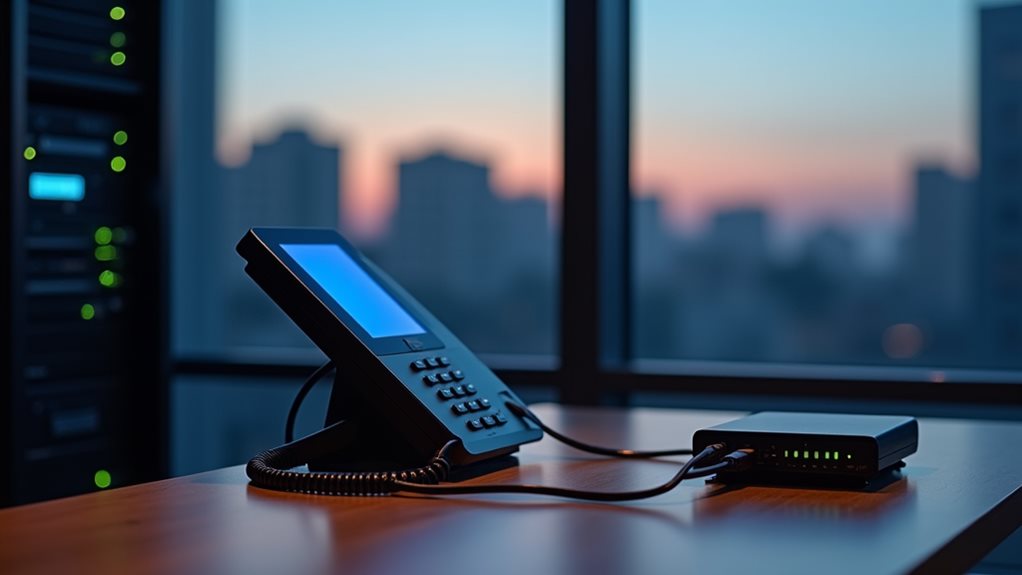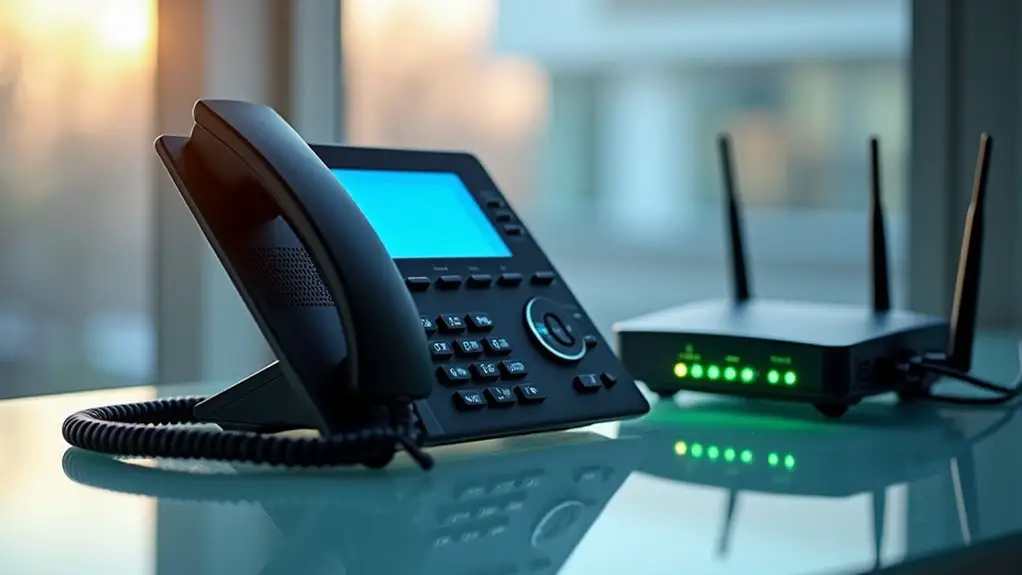Fixed VoIP technology links your phone service to a verified physical address while leveraging internet-based telecommunications. You'll get traditional landline reliability combined with advanced VoIP features through a system that utilizes PSTN for address verification before routing calls over the internet. Your communications benefit from enhanced security protocols, including AES 256 encryption and multi-factor authentication, alongside precise location tracking for E911 services. You'll maintain crystal-clear voice quality and access advanced features like call queuing and unified callbox capabilities, all while reducing communication costs. These fundamental aspects only scratch the surface of Fixed VoIP's extensive business communication solutions.
Understanding Fixed VoIP Technology
The fixed Voice over Internet Protocol (VoIP) technology represents a hybrid communication system that merges traditional landline stability with modern internet-based telephony. This system operates by establishing a connection through the Public Switched Telephone Network (PSTN) to verify a registered physical address before routing calls via internet protocols. The integration of cost-effective features allows businesses to significantly reduce their communication expenses compared to traditional phone systems.
Among the key fixed VoIP benefits, you'll find enhanced security protocols that protect against unauthorized access and data breaches. The technology's association with a physical location provides robust caller ID verification and reliable emergency service access. You're also getting improved business credibility through location-based authenticity. Fixed VoIP enables businesses to maintain simplified compliance with various regulations while reducing administrative burdens.
However, you should consider fixed VoIP limitations when implementing this technology. The system requires more complex setup procedures, including physical address verification and infrastructure installation. You'll encounter higher initial costs and ongoing maintenance requirements compared to non-fixed alternatives.
The technology's fixed nature also presents scalability challenges for businesses with remote workforce needs. The architecture prioritizes stability and security over mobility, making it particularly suitable for established business locations handling sensitive communications.
Your organization's network infrastructure must support the consistent bandwidth requirements necessary for maintaining call quality and reliability.
Core Features and Capabilities
Fixed VoIP's enhanced security protocols guarantee your communications remain protected through advanced encryption and authentication mechanisms that safeguard against unauthorized access.
Your physical address integration within the Fixed VoIP system enables precise location tracking and establishes a permanent point of service, critical for both business operations and compliance requirements. Businesses can effectively manage large volumes of calls through call queuing features that optimize customer service delivery. The system provides access to unified callbox capabilities that consolidate all communications into one streamlined interface.
The system's emergency response support includes E911 capabilities, which automatically transmit your exact location to emergency services when you place emergency calls, guaranteeing rapid and accurate response times.
Enhanced Security Protocols
Safeguarding your VoIP communications requires robust security protocols that protect against unauthorized access and cyber threats.
Today's fixed VoIP systems implement advanced encryption techniques, including AES 256, to guarantee end-to-end protection of your voice data during transmission. Fixed VoIP numbers provide enhanced PSTN connectivity compared to non-fixed VoIP. You'll find that these encryption methods effectively prevent call interception and eavesdropping while maintaining peak call quality.
Authentication methods have evolved to include Multi-Factor Authentication (MFA), moving beyond traditional password systems.
You'll need to configure your VoIP system to use email verification rather than SMS-based OTPs, as the latter presents vulnerabilities. Your network's security infrastructure should include properly configured firewalls and Intrusion Detection Systems that monitor traffic patterns and block suspicious activities in real-time.
Fixed VoIP systems provide reliable call tracking for enhanced business transparency and security.
You must verify your VoIP system complies with STIR/SHAKEN standards to combat spoofing attempts.
Additionally, implementing Secure Real-Time Transport Protocol (SRTP) and Session Initiation Protocol (SIP) will secure your call setup and transmission processes.
Through network segmentation and regular security audits, you'll maintain a robust defense against emerging threats while meeting regulatory requirements for secure communication.
Physical Address Integration
Through physical address integration, fixed VoIP systems establish a concrete link between your telecommunication services and a specific geographical location. This integration requires rigorous address verification protocols that authenticate your physical presence within the service area, guaranteeing your area code matches the registered location.
When you provision a fixed VoIP number, you'll need to provide detailed location information that connects directly to the PSTN through SIP trunking. This setup maintains location accuracy by restricting service usage to your registered address, unlike non-fixed VoIP solutions that operate from any internet connection. The transition to fixed VoIP can result in up to 50% savings compared to traditional phone systems. The system automatically routes emergency calls to the nearest Public Safety Point for rapid response. Additionally, integrating with SIP trunking allows for multiple concurrent calls, enhancing communication efficiency for businesses.
The system validates your geographical position to guarantee compliance with local telecommunications regulations and E911 requirements.
Your fixed VoIP connection prioritizes network traffic through your ISP, optimizing call quality and reducing latency. The address integration enhances your telecommunication capabilities by enabling reliable caller ID functionality and seamless integration with existing PSTN infrastructure.
You'll benefit from advanced features like call forwarding and voicemail while maintaining the stability of a location-bound service. This physical address requirement creates a trustworthy communication platform that's particularly valuable for business operations requiring verified, location-specific phone numbers.
Emergency Response Support
One of the most vital components of fixed VoIP systems is their robust emergency response support framework, which integrates advanced E911 capabilities with IP-based communication protocols.
You'll find that these systems enable precise location tracking and automatic routing of emergency calls to the nearest response centers, guaranteeing rapid deployment of emergency services when seconds count. Furthermore, the integration of VoIP technology allows for enhanced overall communication reliability during emergencies.
The infrastructure leverages IP-based networks to maintain uninterrupted communication channels during crisis situations, supporting real-time coordination between emergency responders and dispatch centers.
Your emergency training programs can seamlessly integrate with these systems, utilizing video conferencing and instant messaging features to enhance community preparedness and response capabilities.
The platform's security protocols incorporate advanced encryption methods to protect sensitive emergency communications, while failover capabilities guarantee continuous operation even during network disruptions.
You'll benefit from the system's ability to transmit vital data, including caller location and callback numbers, automatically to emergency services.
The system's multiple redundant servers ensure continuous operation and maintain critical communication pathways during emergencies.
Providers like RingCentral ensure access to basic and enhanced 911 services for immediate emergency response support.
This enhanced functionality, combined with the cost-effectiveness of VoIP technology, delivers superior emergency response support compared to traditional telephone systems, making it an essential component for modern emergency management infrastructure.
Security and Reliability Advantages

Fixed VoIP's anchored network architecture provides robust data protection through its geographically-bound infrastructure, greatly reducing vulnerabilities common to nomadic VoIP solutions.
You'll find that fixed VoIP endpoints maintain consistent security protocols by connecting through dedicated physical locations, making unauthorized access and data breaches considerably more difficult to execute.
The system's location-locked nature enables precise emergency response coordination, with your exact physical address automatically transmitted to Public Safety Answering Points (PSAPs) during emergency calls. Additionally, encryption methods ensure that voice data remains secure during transmission, further enhancing the protection of sensitive information.
Enhanced Data Protection Measures
Modern VoIP systems incorporate multiple layers of data protection measures to guarantee secure and reliable communications. The infrastructure combines robust data encryption protocols, including SRTP and SIPS over TLS, with thorough security audits to maintain system integrity.
You'll find that fixed VoIP implementations offer enhanced traceability through geographic location verification and physical address registration.
To strengthen your VoIP security posture, you'll need to implement multiple defensive layers. These include firewalls and intrusion detection systems (IDS) that monitor network traffic for suspicious activities.
You should also utilize network segmentation to isolate sensitive communications and enforce multi-factor authentication (MFA) for user access. Regular software updates and firmware patches are essential for maintaining system security.
Your VoIP system's physical security is equally important. You'll want to secure endpoints with proper locks and restrict access to authorized personnel only.
Additionally, implementing VPN connections for remote access and conducting regular call log reviews helps detect potential security breaches. Data loss prevention (DLP) technologies and deception mechanisms provide additional protection for your endpoints, while strict user access controls and credential management policies maintain system-wide security.
Implementing advanced encryption protocols like AES-256 and TLS further enhances the protection of voice data in your VoIP communications.
Location-Based Emergency Response
Building upon robust security protocols, location-based emergency response capabilities represent a significant advancement in VoIP technology. When you implement fixed VoIP systems, you'll benefit from enhanced location accuracy that enables swift emergency response through Automatic Location Information (ALI) transmission to Public Safety Answering Points (PSAPs).
Your fixed VoIP system integrates sophisticated emergency routing algorithms that direct calls to the nearest PSAP based on your registered physical address. Through Location-to-URL Mapping Protocol (LUMP), you'll experience improved call routing without hierarchical constraints, ensuring rapid emergency response times.
The system's Enhanced Dynamic Location Tracking further refines location precision, while Session Border Controllers maintain network integrity during emergency communications.
You'll find that fixed VoIP's emergency response framework surpasses non-fixed alternatives, particularly in meeting FCC E911 regulations. By utilizing Cisco Discovery Protocol (CDP) and existing network infrastructure, your system can pinpoint caller locations with remarkable accuracy. Moreover, maintaining updated physical address details is essential for ensuring accurate emergency call routing and response efficiency.
This all-encompassing approach to location-based emergency services not only enhances your organization's safety protocols but also streamlines compliance with emergency service regulations while maintaining peak response efficiency.
Business Applications
Throughout the corporate landscape, Fixed VoIP technology delivers extensive business communication solutions that transcend traditional telephony limitations. You'll find that Fixed VoIP's crystal-clear voice quality and multichannel support enhance business continuity while elevating customer engagement through seamless integration of voice, video, and messaging platforms.
When you implement Fixed VoIP in your business infrastructure, you'll leverage real-time analytics to track performance metrics and optimize communication efficiency. The system's scalability allows your organization to expand operations without significant infrastructure modifications, while unified communication tools streamline collaboration across departments and remote locations.
You can integrate Fixed VoIP with your existing telecommunication systems, enabling a hybrid approach that maintains connectivity with traditional PSTN lines. The technology's advanced call management features empower your customer service centers to handle inquiries more effectively, while supporting remote work capabilities through internet-based connectivity.
To maximize your VoIP deployment, you'll need to select a provider offering robust security protocols, reliable uptime, and extensive feature sets. The provider's scalability options should align with your growth trajectory, ensuring sustained communication capabilities as your business expands globally. Additionally, as the global VoIP market continues to grow, it becomes increasingly essential for businesses to adopt these technologies to remain competitive.
Emergency Services Support

Three critical components define Fixed VoIP's emergency services support: Enhanced 911 (E911) integration, precise location tracking, and automated dispatch routing. When you make an emergency call through Fixed VoIP, the system automatically transmits your registered physical address to the nearest emergency call center, enabling rapid response deployment.
Unlike non-fixed VoIP solutions, Fixed VoIP adheres to strict emergency call protocols that guarantee your location data appears instantly on the dispatcher's screen. Your VoIP provider responsibilities include maintaining accurate E911 databases and implementing robust emergency routing systems. They must also guarantee you can update your location information whenever needed.
As emergency services shift to Next Generation 911 (NG911), Fixed VoIP's integration becomes increasingly essential. You'll find that providers like RingCentral support broad E911 functionality, though you should verify emergency services support before choosing any provider.
The system's architecture guarantees that your emergency calls aren't just connected but are routed to the appropriate Public Safety Answering Point (PSAP). This level of precision in emergency response capability distinguishes Fixed VoIP from other communication solutions, making it a reliable choice for both business and residential applications. Regular PSAP test calls ensure that the VoIP emergency services remain functional and compliant with regulations.
Fixed Vs Non-Fixed Voip
Understanding the distinction between fixed and non-fixed VoIP systems reveals fundamental architectural differences in their deployment and operation.
Fixed VoIP numbers maintain a permanent association with a physical address, providing enhanced security protocols and reliable emergency service access. The fixed advantages include consistent caller ID presentation and increased credibility, particularly beneficial for regulated industries like banking and financial services.
In contrast, non-fixed flexibility allows for deployment without geographic constraints, enabling rapid scalability and remote team operations. You'll find non-fixed VoIP systems typically cost less to implement and maintain, while offering unrestricted mobility across any internet connection. This architecture particularly suits organizations with international calling requirements or those needing to establish multi-regional presence.
When selecting between these architectures, you'll need to evaluate your specific business requirements. Fixed VoIP systems excel in scenarios demanding robust security and regulatory compliance, while non-fixed solutions optimize for cost efficiency and operational agility. Additionally, VoIP technology is increasingly shaping the future of business communication with enhanced functionality and customer experience.
Consider factors such as your industry's regulatory framework, budget constraints, and growth projections. The decision ultimately hinges on balancing the enhanced security of fixed systems against the operational flexibility of non-fixed alternatives.
Implementation Challenges and Costs

Implementing a fixed VoIP system presents several technical hurdles that require careful planning and resource allocation. Your primary challenge lies in network optimization, where you'll need to guarantee your infrastructure can support VoIP traffic efficiently.
You'll need to conduct thorough network assessments to identify bottlenecks and implement QoS policies to prioritize voice data packets.
Security poses another significant concern, as VoIP systems are vulnerable to cyber threats. You'll need to select a provider offering robust encryption and VPN capabilities while maintaining regular security audits.
Your hardware infrastructure must also meet specific requirements, potentially necessitating upgrades to support high-quality calls.
The cost analysis of fixed VoIP implementation involves both initial investments and ongoing expenses. While upfront costs may be higher due to hardware requirements and infrastructure upgrades, you'll typically see monthly fees around $20 per user.
Your ISP selection critically impacts system performance, so you'll need reliable, high-speed internet connectivity, possibly with failover mechanisms.
Though non-fixed VoIP solutions offer greater scalability at lower costs, fixed VoIP systems can still provide long-term savings through reduced call costs and maintenance expenses. Additionally, understanding VoIP protocols is essential for optimizing your system's performance and ensuring seamless communication.
Frequently Asked Questions
Can I Keep My Existing Phone Number When Switching to Fixed Voip?
Yes, you can keep your existing number through number porting during service change. Your fixed VoIP provider will coordinate the transfer process, enabling you to maintain your current phone number with minimal disruption.
What Happens to Fixed Voip Service During Power Outages?
You'll lose your VoIP service during power outages unless you've implemented power backup solutions. To maintain service reliability, you'll need a UPS or battery backup for your modem, router, and VoIP equipment.
How Many Simultaneous Calls Can a Fixed Voip Line Handle?
Your fixed VoIP line's call capacity isn't inherently limited but depends on your device model and network limitations. You'll typically get between 3-100 simultaneous calls, with most systems supporting around 50 concurrent connections.
Does Fixed Voip Require Special Phones or Equipment?
You won't need special phones, as fixed VoIP offers standard equipment compatibility. You can use regular IP phones, softphones, or analog phones with ATAs, but you'll need proper network infrastructure and address registration.
Can Fixed Voip Numbers Be Used for Sending and Receiving Text Messages?
Yes, you'll find that fixed VoIP numbers support text messaging capabilities through SMS and MMS protocols. Your VoIP service interface enables you to send and receive messages using standard digital transmission over internet networks.
Final Thoughts
Fixed VoIP technology delivers enterprise-grade voice communications through a registered physical address and dedicated IP network infrastructure. You'll benefit from enhanced E911 support, superior QoS metrics, and stronger security protocols compared to non-fixed alternatives. When implementing fixed VoIP, you're investing in a stable, traceable communication system that integrates seamlessly with your existing network architecture while ensuring regulatory compliance and reliable service delivery.

